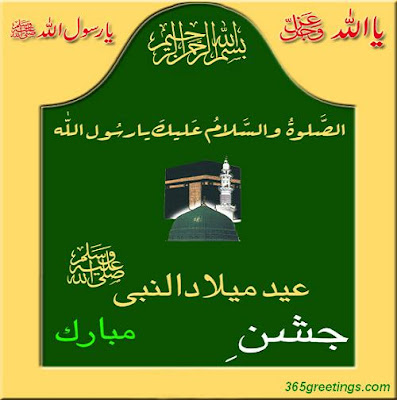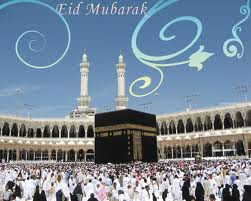Eid-E-Milad2013 Celebration
The tradition of celebrating the Holy Prophet’s birthday on a large scale began in Egypt by the Prophet’s descendants, through his daughter Fatima. It was celebrated mainly by religious scholars and religious establishments. They gathered to hear sermons, distributed sweets, alms and particularly honey, the Prophet’s favourite.
When we celebrate Milad, we gather, in order to send salutations (Esal-e-Swaab) to the Prophet [May Allah bless him and grant Him peace], give charity to the poor (Sadaqah Khairat) and remember wilaadah(Birth) and virtues of the Prophet [May Allah bless him and grant Him peace]. The Ahl as-Sunnah does not say that one must celebrate “Milad” only on 12 Rabee’-ul-Awwal, in fact it can be celebrated at anytime of the year. Generally Milad-un-Nabi is celebrated, on the 12th of Rabee’ul-Awwal, by Muslims all over the world. In every Muslim country, there is a public holiday for “Milaad-un-Nabee”, except one country, but even in that country, the people celebrate “Milaad” individually. The birth of the Anbiyaa’ has been mentioned in the Qur’an. For example, Adam, Musaa, Eesaa, and Yahyaa (May Allah bless them and grant them peace). If it is wrong to talk about the birth of the Prophet (May Allah bless him and grant him peace), then why has Allah TA’ALA mentioned it in the Qur’an?
Hafidhh Ibn Taymiyyah writes:
“Those people who celebrate Milaad through the love and respect of the Prophet [May Allah bless Him and grant Him peace], will be rewarded by Allah.
[Iqtidaa’ us-siraat-il-Mustaqeem, page 294]
He also writes that:
If someone celebrates Milaad with the love and respect of Prophet [May Allah bless him and grant Him peace], he will have a “big reward”. He says that in Muslim communities, Milaad-un-Nabi gatherings are only done with the respect and love of the Muslims for the Prophet [May Allah bless him and grant Him peace]
[Iqtidaa’ as-siraat-il-Mustaqeem, page 297, by Hafidhh Ibn Taymiyyah]
Hafidhh Ibn Kathir wrote that:
There was once a King, Abu Sa’eed Malik Muzaffar – a man of good deeds. In his kingdom, wherever he saw a lack of water, he would build a well. He also established many Islamic study centers. Every year, he would spend half a million dinars on hosting a gathering of his people to celebrate the birthday of the Prophet [May Allah bless Him and grant Him peace]
[Tareekh Ibn Kathir, see story of King Abu Sa’eed, Volume 13]
Ibn Muhammad bin Abdul Wahhab Najdi, in his book, writes:
“Thuwaiba, who was the freed slave of Abu Lahab fed Rasolallah Sallalalhu ‘alaihi wa sallam milk. Abu Lahab freed Suwaiba at the time when she informed him that a son has been born at your brother’s house. After the death of Abu Lahab he was seen in a dream, in which he said ‘I am in severe punishment but this is lessened on Mondays, he showed his forefinger, and said that he would suck from it. This is so because it was with this finger that I freed Suwaiba when she informed of the birth of the Prophet, and she also fed the Prophet Sallalalhu ‘alaihi wa sallam milk”. Ibn Jawzi states: Abu Lahab is that kaafir who has been specially referred to, in the Qur’an. If such a person can be rewarded for celebrating the Milaad of the Prophet Sallalalhu ‘alaihi wa Sallam, then imagine how great the reward would be for a Muslim when he celebrates it.
[Mukhtassar Sirat-ur-rasool, “Milaad-un-nabi”, by Ibn Muhammad bin Abdul wahhaab Najdi].
The above is evidence that celebrating the birthday of the Prophet [May Allah bless Him and grant Him peace] in the form of a gathering is permissible. Otherwise Hafidhh Ibn Kathir would not have referred to it as a good deed and Hafidhh Ibn Taymiyyah would not have said that there would be a “big reward” for doing so.
Some people have the opinion that King Abu Sa’eed introduced the celebrating of this occasion. This is not true because Hafidh Ibn Kathir states that in the 5th Century hijree, a King named Malik Shah celebrated it also with a gathering
[Tareekh Ibn Katheer biography of Malik Shah]
Some people even argue that the Holy Prophet was not even born on the 12th Rabbi Awwal. This argument is baseless, as Hafidh Ibn Kathir has discussed this in Sirat-un-nabi. He states that the majority of the scholars agree that the Prophet was born on the 12th of Rabee’ul-Aawal. The evidence of the people who do not accept this is weak.
(As-Sirat-un-nabi, vol.1, “Birth of the Prophet [May Allah bless him and grant Him peace]”)
Muhammad Ibn Is-haaq states that the Prophet was born on the 12th of Rabee’ul-Awwal.
(Seerah Ibn Hashaam, “Chapter Birth of the Prophet [May Allah bless him and grant Him peace]”)
Ibn Is-haaq was a Taabi’ and was born in 75 Hijrah. His book is the oldest book available of seerah in Islamic history. The first book of Seerah was written by Musa bin Uqba. This book is no longer avaiable for reference.
The Ahl as-Sunnah celebrate the Milaad of the Prophet [May Allah bless Him and grant Him peace] with love and respect. If someone does not celebrate it, we do not call them a kaafir because the matter of Milaad does not affect the ‘Aqeedah of a person. The celebrating of this should not cause any divisions among Muslims.
Hafidhh Salaahuddeen Yoosuf [A great follower of Hafidhh Ibn Taymiyyah and Shaikh Najdee] writes:
On the birth date of the Prophet [May Allah bless him and grant him peace], to give charity to the poor or to build a Masjid. We agree in this type of celebration of Milaad.
(Milaad-un-nabi, by Hafidhh.Yoosuf, page 92)
Hafidh Ibn Kathir writes: “On the day of the birth of Prophet[May Allah bless Him and grant Him peace], Shaytaan cried a lot.”
(Sirat-un-nabi, “Birth of the Prophet [May Allah bless him and grant Him peace]”, by Hafidh Ibn Kathir)
From Ibn Kathirs narration we can see that to feel unhappy on the Birthday of the Prophet [May Allah bless him and grant him peace] is the way of shaytaan not the way of a Muslim!
Eid-e-Milad2013 Sms
1)
Allah Tallah Hum Sab Ko Sedhi Raah
Ameen
HAPPY EID E MILAAD
2)
Hazrat Ali Ka Farmaan Hey Ke
“Sazaa Deaynay Meyn Dair Karo Yahan Tak Kay
Tumhara Ghussa Thandaa Ho Jaye”
3)
Wishing you all a very happy eid-e-milad,
And hoping that all the things you wish
For will be yours throughout the year…
Eid-e-milad mubarak
4)
May you celebrate the most beautiful eid day
Then may life shower on you abundant joy and happiness
Happy Eid-e-milad
5)
Aaj se aamiri garibi ka fasle na rahe,
Har insan ek duje ko aapna bhai kahe,
Aaj sub kuch bhool ke aa gale lag ja,
Eid-e-Milad2013 Screps












Leave a Reply